| Listing 1 - 10 of 17 | << page >> |
Sort by
|
Book
ISBN: 0691008388 Year: 1989 Publisher: Princeton Princeton university press
Abstract | Keywords | Export | Availability | Bookmark
 Loading...
Loading...Choose an application
- Reference Manager
- EndNote
- RefWorks (Direct export to RefWorks)
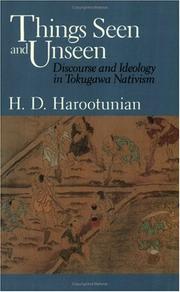
ISBN: 0226317072 0226317064 9780226317076 Year: 1988 Publisher: Chicago University of Chicago Press
Abstract | Keywords | Export | Availability | Bookmark
 Loading...
Loading...Choose an application
- Reference Manager
- EndNote
- RefWorks (Direct export to RefWorks)
Book
ISBN: 9780198795230 0198795238 0191836532 Year: 2017 Publisher: Oxford Oxford University Press
Abstract | Keywords | Export | Availability | Bookmark
 Loading...
Loading...Choose an application
- Reference Manager
- EndNote
- RefWorks (Direct export to RefWorks)
This is a history of intellectual and religious developments in Japan during the Tokugawa period, covering the years 1582-1860. It begins with an explanation of the fate of Christianity, and proceeds to cover the changing nature of the relationship between Buddhism and secular authority, new developments in Shinto, and the growth of 'Japanese studies'. The main emphasis, however, is on the process by which Neo-Confucianism captured the imagination of the intellectual class and informed debate throughout the period. This process was expressed in terms of a never-ending search for the Way, a mode and pattern of existence that could provide not only order for society at large, but self-fulfilment for the individual. The narrative traces how ideas and attitudes changed through time, and is based on the premise that the Tokugawa period is important in and of itself, not merely as a backdrop to the Meiji Restoration of 1868.
Philosophy --- Mental philosophy --- Humanities --- History --- Japan --- Religion --- J1700.60 --- J1008.60 --- Japan: Religion in general -- history -- Kinsei, Edo, Tokugawa period, early modern (1600-1867) --- Japan: Philosophy -- history -- Kinsei, Edo, Tokugawa period, early modern (1600-1867)
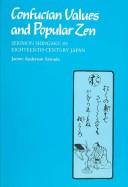
ISBN: 9780824814144 0824814142 Year: 1993 Publisher: Honolulu University of Hawaii Press
Abstract | Keywords | Export | Availability | Bookmark
 Loading...
Loading...Choose an application
- Reference Manager
- EndNote
- RefWorks (Direct export to RefWorks)
"Although East Asian religion is commonly characterized as "syncretic," the historical interaction of Buddhist, Confucian, and other traditions is often neglected by scholars of mainstream religious thought. In this thought-provoking study, Janine Sawada moves beyond conventional approaches to the history of Japanese religion by analyzing the ways in which Neo-Confucianism and Zen formed a popular synthesis in early modern Japan. She shows how Shingaku, a teaching founded by merchant Ishida Baigan, blossomed after his death into a widespread religious movement that selectively combined ideas and practices from these traditions. Drawing on new research into original Shingaku sources, Sawada challenges the view that the teaching was a facile "merchant ethic" by illuminating the importance of Shingaku mystical experience and its intimate relation to moral cultivation in the program developed by Baigan's successor, Teshima Toan."--BOOK JACKET. "This book also suggests the need for an approach to the history of Japanese education that accounts for the informal transmission of ideas as well as institutional schooling. Shingaku contributed to the development of Japanese education by effectively disseminating moral and religious knowledge on a large scale to the less-educated sectors of Tokugawa society. Sawada interprets the popularity of the movement as part of a general trend in early modern Japan in which ordinary people sought forms of learning that could be pursued in the context of daily life."--BOOK JACKET.
Shingaku --- Confucianism --- J1650 --- J1008.60 --- Religions --- Sekimon Shingaku --- Ethics --- History --- Japan: Philosophy -- ethics --- Japan: Philosophy -- history -- Kinsei, Edo, Tokugawa period, early modern (1600-1867) --- Japan --- 18th century --- Shingaku. --- Confucianism - Japan - History - 18th century.
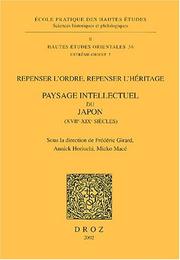
ISSN: 10167005 ISBN: 2600006419 9782600006415 Year: 2002 Volume: 36 2 Publisher: Genève Droz
Abstract | Keywords | Export | Availability | Bookmark
 Loading...
Loading...Choose an application
- Reference Manager
- EndNote
- RefWorks (Direct export to RefWorks)
Japan --- History --- Social life and customs --- Intellectual life --- -Japan --- 1600-1868 --- 17th century --- 18th century --- 19th century --- J1440 --- J1008.60 --- Japan: Philosophy -- Confucianism --- Japan: Philosophy -- history -- Kinsei, Edo, Tokugawa period, early modern (1600-1867) --- Japan - History - 17th century --- Japan - History - 18th century --- Japan - History - 19th century --- Japan - Social life and customs - 1600-1868
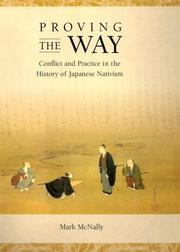
ISBN: 0674017781 1684174090 Year: 2005 Volume: 245 Publisher: Cambridge Harvard university Asia center
Abstract | Keywords | Export | Availability | Bookmark
 Loading...
Loading...Choose an application
- Reference Manager
- EndNote
- RefWorks (Direct export to RefWorks)
Kokugaku --- National Learning Movement --- Wagaku --- J1450 --- J1008.60 --- Philosophy, Japanese --- Japan: Philosophy -- kokugaku, Japanism, Yamatoism --- Japan: Philosophy -- history -- Kinsei, Edo, Tokugawa period, early modern (1600-1867) --- Hirata, Atsutane (1776-1843) --- Japan --- Intellectual life --- -J1450 --- -Kokugaku --- Hirata, Atsutane, --- Hirata, Ibukinoya, --- Hirata, Daigaku, --- Taira, Atsutane, --- Ibukinoya, --- Taigaku, --- Taikaku, --- Hirata, Taigaku, --- 平田篤胤, --- 1600-1868 --- Hirata, Atsutane
Book
ISBN: 9789004216730 9004216731 9786613591296 9004229019 1280496061 9789004229013 Year: 2012 Volume: 38 Publisher: Leiden Brill
Abstract | Keywords | Export | Availability | Bookmark
 Loading...
Loading...Choose an application
- Reference Manager
- EndNote
- RefWorks (Direct export to RefWorks)
In the Edo period, Japan had its first experience of what one might call “intellectual life” in a pregnant sense of the word: a scene that combined serious intellectual pursuits, from poetry writing to the interpretation of the Confucian classics, with intense social interaction. Edo-period Japan was crisscrossed by networks of poets, scholars, artists and collectors who exchanged information, discussed each other’s work, cooperated in collaborative projects, and gossiped about each other. Intellectual life in Edo Japan was a seething cauldron of social interaction and competition, sometimes harmoniously productive, sometimes destructively vicious, but never stagnant. This volume, compiled in honour of Prof. W.J. Boot, offers eleven essays that explore the intellectual scene of Edo-period Japan from a variety of perspectives.
J1008.60 --- Japan: Philosophy -- history -- Kinsei, Edo, Tokugawa period, early modern (1600-1867) --- Japan --- Intellectual life --- -History --- -Festschrift - Libri Amicorum --- History --- Festschrift - Libri Amicorum --- History. --- Annals --- Auxiliary sciences of history --- Boot, W. J. --- Boot, W.J. --- Boot, Willem J. --- Boot, Wim
Book
ISBN: 0691075662 Year: 1974 Publisher: Tokyo University of Tokyo press
Abstract | Keywords | Export | Availability | Bookmark
 Loading...
Loading...Choose an application
- Reference Manager
- EndNote
- RefWorks (Direct export to RefWorks)
J1008.60 --- S35/0500 --- S35/0600 --- S35/0900 --- Political science --- -#SML: Joseph Spae --- Administration --- Civil government --- Commonwealth, The --- Government --- Political theory --- Political thought --- Politics --- Science, Political --- Social sciences --- State, The --- Japan: Philosophy -- history -- Kinsei, Edo, Tokugawa period, early modern (1600-1867) --- Japan--History: general works and before Meiji (1868) --- Japan--Law, politics and government --- Japan--Philosophy --- History --- History. --- #SML: Joseph Spae
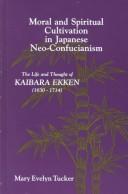
ISBN: 088706891X Year: 1989 Publisher: Albany (N.Y.) : State university of New York press,
Abstract | Keywords | Export | Availability | Bookmark
 Loading...
Loading...Choose an application
- Reference Manager
- EndNote
- RefWorks (Direct export to RefWorks)
J1008.60 --- J1440 --- J1560 --- J1650 --- Japan: Philosophy -- history -- Kinsei, Edo, Tokugawa period, early modern (1600-1867) --- Japan: Philosophy -- Confucianism --- Japan: Philosophy -- individual philosophers -- Kinsei, Edo, Tokugawa period, early modern (1600-1867) --- Japan: Philosophy -- ethics --- Kaibara, Ekiken, --- Kaibara, Atsunobu --- Ekiken, Kaibara, --- Kaibara, Ekken --- Sonken --- Kaibara, Sukesaburō --- Kaibara, Kyūbē --- Kaibara, Shisei --- 貝原盆軒 --- 貝原益軒 --- 貝原篤信 --- 카이바라, 에키켄
Book
ISBN: 9784924971325 4924971324 Year: 2012 Volume: 30 Publisher: Tokyo International house of Japan
Abstract | Keywords | Export | Availability | Bookmark
 Loading...
Loading...Choose an application
- Reference Manager
- EndNote
- RefWorks (Direct export to RefWorks)
Political science --- Political scientists --- Science politique --- Politologues --- History --- Histoire --- J4610 --- J4600.60 --- J4600.70 --- J1008.60 --- J1008.70 --- Japan: Politics and law -- theory, methodology and philosophy --- Japan: Politics and law -- history -- Kinsei, Edo, Tokugawa period, early modern (1600-1867) --- Japan: Politics and law -- history -- Kindai (1850s- ), bakumatsu, Meiji, Taishō --- Japan: Philosophy -- history -- Kinsei, Edo, Tokugawa period, early modern (1600-1867) --- Japan: Philosophy -- history -- Kindai (1850s-1945), Bakumatsu, Meiji and Taishō --- Political science - Japan - History
| Listing 1 - 10 of 17 | << page >> |
Sort by
|

 Search
Search Feedback
Feedback About UniCat
About UniCat  Help
Help News
News